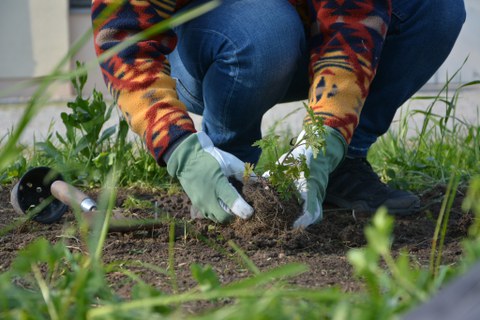Apr 28, 2023
Conserving and developing the campus as a habitat for animals and plants
TU Dresden’s campus has a new wildflower meadow. On April 27, members of the Biodiversity and Ecosystems Services group, in collaboration with the Foundation Lecture on Ecological Sustainability, planted a wildflower meadow on an area of 200 square meters at the Center for Integrated Natural Materials Technology. This is the first insect-friendly meadow of its kind, and more are in planning. The project aims to increase plant biodiversity on campus, thus significantly improving conditions for bees, butterflies and other insects.
“Universities can contribute to preserving biodiversity by transforming their campuses into living labs for species conservation and climate adaptation – so that environmental damage caused by urbanization, for example, can be prevented,” explains Prof. Remmer Sassen, Chair of Business Administration, esp. Environmental Management at TU Dresden’s International Institute (IHI) Zittau. Sassen is a member of the Environment Commission’s Biodiversity and Ecosystems Services group.
His Chair, the Green Office, Directorate 4 – Facility Management and the Student Environmental Initiative tuuwi established this volunteer group at TU Dresden. It is a pioneering project that aims to conserve and protect biodiversity and ecosystems on TUD’s campus. At the same time, the work of the group helps TU Dresden’s campus design team to achieve their sustainability strategy goals. The creation of a greener and more sustainable campus, which should be an inviting place of rest and relaxation for the community, is one of these goals. To this end, the university is undertaking research and practical projects in which both students and staff can get involved.
“We want to take on a pioneering role. We also want to collect and initiate good examples so we can bring biodiversity projects like the wildflower meadow to campus together with administrative staff, academic staff and, above all, students, and raise awareness of biodiversity,” says Sassen, explaining his involvement in the project.
Work began back in May 2017 to establish insect-friendly meadows to significantly improve conditions on campus for bees, butterflies and other insects. Supported by experts from the “Puppenstube gesucht” project, the Dresden Beekeepers’ Association’s “Biene sucht Blüte” group, and in collaboration with the Sächsisches Immobilien- und Baumanagement (SIB) state enterprise, they developed principles for the insect-friendly management of meadows on the TU Dresden campus, aimed primarily at significantly reducing lawn mowing. Moreover, about 30 percent of the meadow area is left uncut during lawn mowing, providing insects with a safe haven. Since 2018, 2.4 hectares of meadow space at 8 locations on campus have been looked after with insects in mind.
More information
Will we become extinct if bees disappear? “Gute Frage” (Good question) on the decline in insect populations:
https://youtu.be/iECC_nbj6fo
What’s the best way to build an insect hotel? Find out on “Kurze Frage” (“Quick question”) with Tom Stieler from the Student Environmental Initiative tuuwi:
https://youtu.be/WADveHmOmpQ
About the Environment Commission
The University Executive Board has set itself the goal of pursuing a consistent environmental policy for TU Dresden and incorporating environmental protection as a key topic into all organizational units of the university. For this purpose, the Environment Commission is on hand to advise the University Executive Board on environmental issues and to promote environmental protection. The Environment Commission’s various groups work on topics relevant to the environment and sustainability.
The volunteer work of the Biodiversity and Ecosystems Services group aims to conserve and protect biodiversity and ecosystems on the TUD campus. Research and practical projects are undertaken within this context. This group is open to all TU Dresden students and staff, irrespective of their study or employment backgrounds.
Contact:
Ulrike Seiler
Sustainable Campus Coordinator
Tel.: +49 351 463-33059

